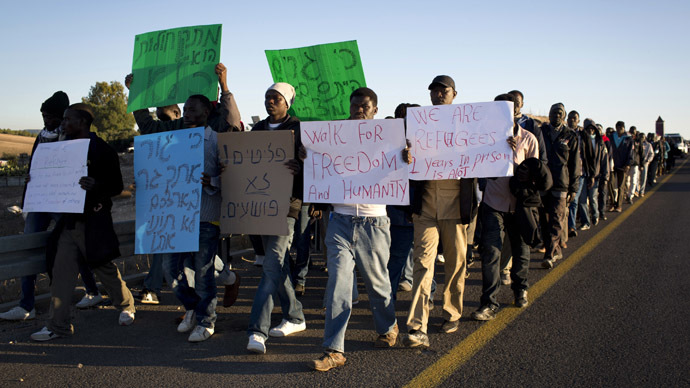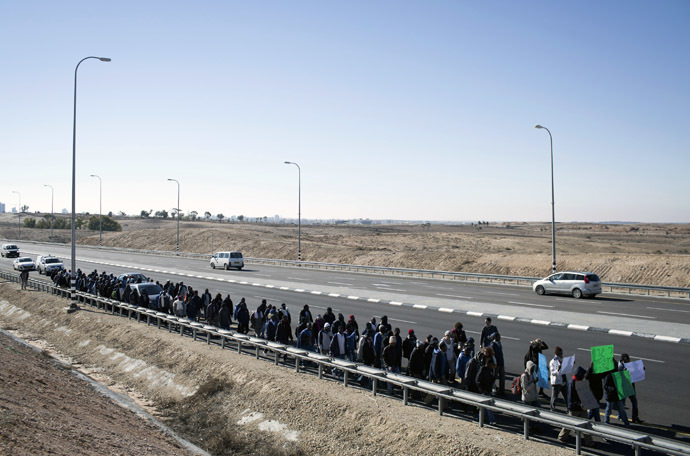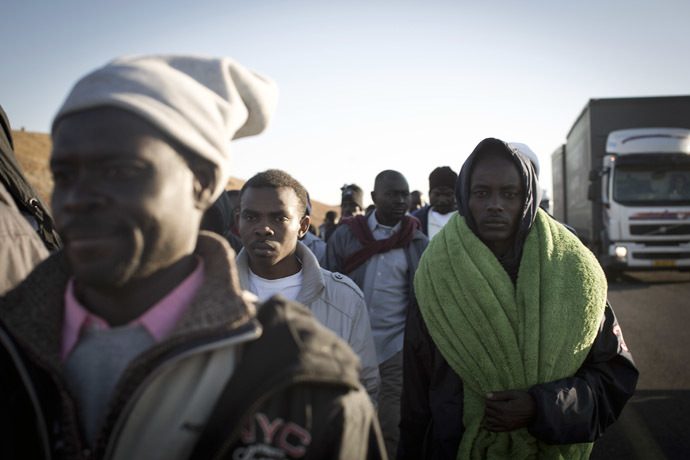21st century ghetto: Israel plays with human rights, using gaps in international law

Two situations capture the moral imagination as Christmas holidays approach: the plight of undocumented migrant workers from sub-Saharan Africa who are living in Israel, and the even direr humanitarian emergency in the Gaza Strip.
Reports about illegal immigrants from Eritrea, Sudan and other African countries who have entered Israel in recent years, seeking asylum and refugee status, being sent to a “de facto jail” raise questions about how a modern and progressive state can deprive people of liberty without charge or any specified release date.
So far, Israel has taken the position (which seems generally accurate) that these African migrants, of which there are some 55,000, are not entitled to refugee status because their motivation was economic, and that there is no evidence that they face persecution. Unfortunately, governments have virtually unlimited authority to make such a determination without any right of the immigrant to mount a legal challenge – beyond what may be granted in the domestic legal system. International law is vague and unsatisfactory, although the UN Convention on the Status of Refugees does confirm the rule that no one can be forcibly deported to their country of nationality if they face the prospect of persecution upon return as a result of their race, religion or political views.
The issue has recently surfaced in an ugly form as right-wing extremists in Israel have demanded that the government take stronger measures to prevent future entry and to detain and deport those who are currently present. They argue that such immigrants pose security problems by engaging in crime and they also dilute the Jewish character of Israel.
In response, the government has constructed a fence along its 230-kilometer border with Egypt. Israel has also been negotiating deals with several African countries who are agreeing to take tens of thousands of migrants in exchange for a package that includes military equipment and training, and economic assistance relating to agriculture.
What has caused concern among human rights groups is the prospect of putting these illegal migrants in a large detention center that is being built in the Israeli desert. A leftist Israeli politician, Zahava Galon, raised a poignant objection: “Is this how we, as a people who have asylum, treat human beings?” Of course, in Nazi times the Jews of Israel, more than any people of Earth were both asylum seekers and victims of exclusionary policies by the cruel self-righteous liberal democracies that invoked their sovereign rights.

The official response is that the state in Israel is doing its best to strike a balance between protection of borders and infiltration and human rights, but with such historical memories, we might have expected more empathy by the leaders and public in Israel.
Actually, international law and human rights standards have far too little to say about the vulnerability of these migrants. Israel is entitled to conclude that according to the legal definition of refugee these individuals do not qualify, as their motivation appears to have been economic, although some claim they face harsh punishments if they are deported to their country of nationality. Once denied refugee status, a government has broad discretion to detain and deport migrants. The whole situation points up the dangerous gap in the law that leaves such individuals in acutely vulnerable situations.
What is obviously needed is a lawmaking treaty that addresses the challenge of illegal and unwanted economic migrants as a humanitarian challenge to the international community as a whole. Until this happens, and it is unlikely in the current internationally stressed situation, the tragic fate that confronts these undocumented migrants in Israel is likely to be repeated elsewhere.
However, such an ethically disappointing approach is nothing new for Israel, taking into consideration that no less compelling and even more dramatic is the situation in Gaza, where the 1.7 million resident Palestinians have been blockaded by Israel since the middle of 2007 when Hamas took over the governance of the territory. The blockade, which has slightly eased in recent years, was a form of collective punishment, violating Article 33 of the 4th Geneva Convention, and amounting to a crime against humanity. It was a punitive measure imposed by Israel to punish the people in Gaza for voting in favor of Hamas in 2006 legislative elections and partly to make political life as difficult as possible for Hamas. To ease the burdens on the population, Gaza depended on an extraordinary tunnel network to bring supplies across the border from Egypt, and although it meant Gaza residents would be paying black market prices, it did provide the people with the necessities of life.

Since the Egyptian coup of July 3, 2013, the situation in Gaza, always bad, has turned critical. The tunnels have been mainly destroyed by Egypt as an expression of its anti-Hamas outlook and in connection with its Sinai security concerns, resulting in crippling fuel shortages that imperil the health and wellbeing of Gaza in potentially catastrophic ways. Children are wading through streets overflowing with raw sewage, hospital machinery needed for the care of severe kidney and cardiac ailments is unavailable, and there is insufficient fuel for the minimal necessities of life, a situation aggravated in recent days by freezing temperatures.
The silence of neighboring Arab governments, with the notable exceptions of Turkey and Qatar, which have sent Gaza money and fuel, and of the UN, is unforgivable. Even the normally apolitical relief agency, UNRWA, has called publically upon Israel to end the blockade in recognition of the emergency conditions.
In 2011 the UN Security Council invoked R2P, the Responsibility to Protect, to justify a military operation in Libya to protect the civilian population of Benghazi, and then proceeded to seek regime change that had never been authorized. In the context of Gaza, double standards are all too evident. There is no international call for R2P, despite the desperate plight of Gaza residents trapped in an emergency situation, cut off from help by an unlawful blockade. It is time to act. We all have a responsibility to raise our voices and cry, “Shame!”
Richard Falk for RT
Professor Falk is Albert G. Milbank Professor of International Law and Practice, Emeritus at Princeton University, and was Visiting Distinguished Professor in Global and International Studies at the University of California, Santa Barbara (2001–04). He retired from teaching in 2001.
He is a member of the Editorial Boards of The Nation and The Progressive, and Chair of the Board of the Nuclear Age Peace Foundation.
The statements, views and opinions expressed in this column are solely those of the author and do not necessarily represent those of RT.
The statements, views and opinions expressed in this column are solely those of the author and do not necessarily represent those of RT.












